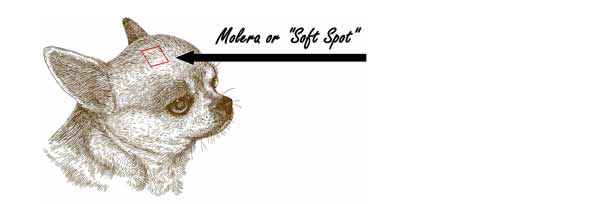MORE
Chihuahua Information
Chihuahuas are generally healthy amongst other breeds of this size. They also outlive most canines, big and small.
Keep in mind that your chihuahua is not likely to face any of these illnesses, but it pays to be aware of them.
Coccidia
Coccidia generally appears when your Chihuahua is going through a stressful period in their life.
Coccidia could appear from stress of weather changes, a puppy weaning, overcrowding, long car or plane ride, going to a new home with their new owners, unsanitary conditions, food changes, or any new situation for your Chihuahua.
Coccidia is a single cell organism that infects your Chihuahua’s intestines. Coccidia can only be detected in a fecal test because the parasites are microscopic and can’t be seen by the naked eye.
A Coccidia infection can cause your Chihuahua to have watery diarrhea which can also be bloody (this is in severe cases) and can be life threatening in young and small Chihuahuas. The reason it can be life threatening, is when your Chihuahua loses fluid and causes your Chihuahua to become dehydranted. However, Coccidia can cause mild symptoms, which can go unnoticed and disappears out of your Chihuahua.
Young puppies can be infected with Coccidia, even if you get your Chihuahua from a good breeder because the puppies can recieve it from their Mother’s feces.
Symptoms
- Watery, thick mucus, and light colored fecal matter.
- Straining when trying to have a bowel movement.
- Rapid dehydration.
- Weight loss
- Bloody diarrhea is noticed in severe cases.
Treating Coccidia doesn’t cost a lot of money and is extremely effective and routine. Your Veterinarian can diagnose coccidia through a feces sample from your Chihuahua, which should be done at the first check up after you purchase your Chihuahua because you will want to have your Veterinarian check your Chihuahua for any worms any way!
Your Veterinarian will prescribe medication that can eliminate or reduce the level that your Chihuahua’s immune system can make it’s own progress against the infection. Permanent damage to the gastrointestinal system is rare and your Chihuahua will most likely make a complete recovery without long lasting negative effects.
The most common drugs used to treat Coccidia infections are Albon, Bactrovet, or Tribrissen. (These drugs shouldn’t be given to dogs that are pregnant.) Using these drugs will stop the production of coccidia organisms and will let your Chihuahua’s immune system to catch up and wipe the infection out.
Usually a good 5 days of medication of the above drugs should be enough to help your Chihuahua’s immune system to take over fighting this infection. However, the medication should be given until the diarrhea stops. If your Chihuahua continues to have diarrhea and you have given the above drugs for 5 days and your Chihuahua’s diarrhea hasn’t stopped, then I would contact your Veterinarian and have your Chihuahua checked out again!
Cockroaches and flies can carry coccidia from one place to another. Mice and other animals can ingest the coccidia and when they are killed and eaten by a dog, can infect the dog with coccidia. So it is important that insects and rodents are under control, to prevent Coccidia.
The coccidia species of dogs and cats don’t infect humans!
Kennel Cough
Canine Infectious Tracheobronchitis Or Kennel Cough
Kennel Cough is a misleading term because Kennel Cough can be contracted by dogs who never been near a kennel! Dogs can pick up the disease in many different situations, such as dog shows, dog groomers, training classes, at your Veterinary, contact with other dogs, taking them to your local pet store, on walks, and passing dogs in the street. Kennel cough is an airborne virus. Kennel cough is very contagious disease which affects the respiratory system of your Chihuahua. It can be influenced by many environmental factors, which is usually produced by a combination of bacterial and viral agents. Your Chihuahua may not display any symptoms of kennel cough for a period of 8 to 10 days, that is the incubation period from the time your Chihuahua was exposed to kennel cough.
Kennel Cough Symptoms
A spontaneous, dry hacking cough or a honking sound, a non-productive cough, (which is easily induced) wheezing, retching, a sound that is described like something was caught in their throat, sound like they are choking, watery nose and eye discharge, lack of appetite, not drinking as much water as they normally do, lethargic, fever, and just acting sick.
There are several different organisms that can cause different viruses and bacteria, that includes, Bordetella Bronchiseptia (airborne bacteria), Canine Parainfluenza (virus), and Mycoplasma (an organism between a virus and a bacteria).
The treatment of the disease is dependent on how severe the case of Kennel Cough is. Treatment could be cough suppressants, antibiotics, bronchodilators, and sprays. You should wash you Chihuahua’s bedding often. In most cases kennel cough will resolve in 10 days to 3 weeks. Your Chihuahua should be seen by your Veterinarian, if their cough lasts longer than 2 weeks.
Antibiotics may be prescribed to prevent secondary bacterial infections, such as pneumonia. You can also cup your hands, and pat your Chihuahua’s chest and you can also use steam inhalation to help your Chihuahua’s cough.
Kennel Cough can last for 4 weeks and your pet will be contagious to other dogs for up to 3 months. So preventing kennel cough is the best thing to do!
Since there are so many different strains and mutations of the virus that is out there, the vaccine Bordatella won’t cover them all! So even though your Chihuahua may have been given a Bordatella vaccine, they still can get kennel cough!
There is no cure for kennel cough but time!
Soft Spot or Fontanel
There is an opening in the skull of a Chihuahua, a hole, a molera. This opening is in the center of the Chihuahua’s forehead. The molera can be very tiny to very large. The edges of the molera can be round and smooth or even jagged. The molera was once considered to be a “mark of being purebred.” However, there are many Chihuahuas that have been well bred and they have little or no molera!
There is only one molera on a Chihuahua because if there is more than one molera this isn’t normal.

The Chihuahua’s molera or fontanel, is considered a breed characteristic and not a defect. Most Chihuahuas have a molera- a soft spot on the top of their head which is similar to the soft spot that human babies are born with. There are many Chihuahuas that are born without the molera but there are just as many Chihuahuas born with one and its presence is nothing to be alarmed over. Most moleras in Chihuahuas do shrink as they mature but it doesn’t always close completely. It can be between a nickel and dime size but the molera can vary in shape and size. The molera shouldn’t be any larger than the size of your thumb print, and there shouldn’t be any swelling, bulging or throbbing. The molera isn’t going to be a problem as long as you are gentle when petting and handling your Chihuahua’s head.
It is very unfortunate, that there are many lay people and some uneducated Veterinarians that are not familiar with the Chihuahua breed and they have tried to link the very presence of a molera with a condition known as hydrocephalus ~ “water head” or water on the brain. There is also a term of open fontanel. (Open fontanels allow the skull to give during the birth to some degree so the puppy can pass through the birth canal. Generally this opening quickly closes up and calcify to make a strong skull.) This has caused many people who aren’t familiar with the Chihuahua breed and the molera, serious concern and undo worry. The truth is that a domed head with a molera present doesn’t predispose the Chihuahua to this condition.
Hydrocephalus
A puppy can be born with hydrocephalus or a brain injury can cause water on ther brain. Hydrocephalus is caused by an excessive accumulation of cerebrospinal fluid in the ventricles of the brain. This compresses the brain against the skull and it may not be noticed until the puppy is several months old. Generally when you see a puppy with water on the brain you will be able to tell immediately that there is something wrong with them.
Signs of Hydrocephalus ~ Water on the Brain
- Wide-set or protruding eyeballs (a lot of white showing at the corners)”easty~westy eyes”
- Blindness
- Abnormal behavior
- Walking in circles
- Slowness both mentally and physically
- Seizures
- Abnormally slow growth
- Lack of coordination
- Easty ~ Westy eyes. In other words, one eye can go to the west and the other to the east.
There is no cure for water on the brain. Mild cases can be treated with sterods and diuretics to reduce pressure, or with surgically inserted shut to divert fluid from the brain to the abodomen.
Having an x-ray isn’t a good indication of hydrocephalus. It is better to have a ultra sound or have a MRI done to determine for sure that your Chihuahua has water on the brain. This would make a definite determination of hydrocephalus.
